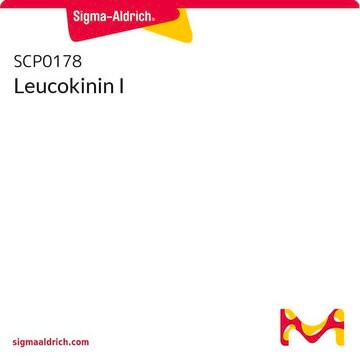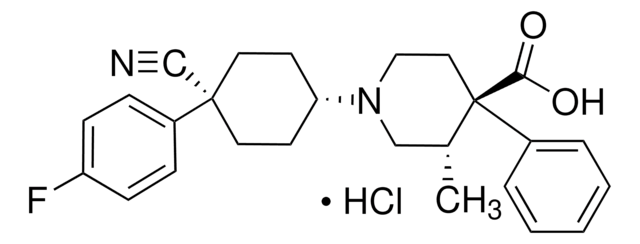SCP0182
[D-Phe2,D-Ala6]-LH-RH
Autenticatiper visualizzare i prezzi riservati alla tua organizzazione & contrattuali
About This Item
Formula empirica (notazione di Hill):
C59H79N15O13
Peso molecolare:
1206.35
Codice UNSPSC:
12352209
NACRES:
NA.32
Prodotti consigliati
Saggio
≥95% (HPLC)
Stato
lyophilized
Composizione
Peptide Content, ≥72%
Condizioni di stoccaggio
protect from light
Temperatura di conservazione
−20°C
Amino Acid Sequence
Glp-Phe-Trp-Ser-Tyr-Ala-Leu-Arg-Pro-Gly-NH2
Applicazioni
Luteinizing-hormone-releasing hormone (LHRH) (GnRH) is a decapeptide (pyroQHWSYKLRPG-NH2) trophic hormone that regulates the release of follicle-stimulating hormone (FSH) and luteinizing hormone (LH) from the anterior pituitary. Various analogues have been developed using D-amino acids to increase resistance to degradation. These analogues are used as potential targeting agents in the development of chemotherapies and as possible agonists and antagonist of the LHRH receptor.
Avvertenze
Danger
Indicazioni di pericolo
Consigli di prudenza
Classi di pericolo
Repr. 1B
Codice della classe di stoccaggio
6.1C - Combustible acute toxic Cat.3 / toxic compounds or compounds which causing chronic effects
Classe di pericolosità dell'acqua (WGK)
WGK 3
Punto d’infiammabilità (°F)
Not applicable
Punto d’infiammabilità (°C)
Not applicable
Scegli una delle versioni più recenti:
Certificati d'analisi (COA)
Lot/Batch Number
Non trovi la versione di tuo interesse?
Se hai bisogno di una versione specifica, puoi cercare il certificato tramite il numero di lotto.
Possiedi già questo prodotto?
I documenti relativi ai prodotti acquistati recentemente sono disponibili nell’Archivio dei documenti.
G Emons et al.
European journal of cancer & clinical oncology, 25(2), 215-221 (1989-02-01)
As a first step to investigate whether gonadotropin releasing hormone (GnRH) analogs might be able to modulate directly the proliferation of human epithelial ovarian carcinomata, we checked if binding sites for GnRH are present in these malignancies. Specific binding of
P J Wormald et al.
The Journal of clinical endocrinology and metabolism, 61(6), 1190-1194 (1985-12-01)
A specific, high affinity receptor for GnRH in human pituitaries obtained post mortem is described. The human pituitary GnRH receptor bound GnRH, a GnRH agonist [(D-Ala6,N alpha-MeLeu7,Pro9NEt)-GnRH], and a GnRH antagonist [Ac-D-Nal(2)1,D-alpha-Me-4-ClPhe2,D-3-Pal3,D-Arg6,D-Ala10 )-GnRH] with similar affinities (KdS of 4.81 nM
Andreas R Günthert et al.
Breast cancer research and treatment, 87(3), 255-264 (2004-11-06)
More than 50% of human breast cancers express receptors for luteinizing hormone-releasing hormone (LHRH-R). These receptors can be used for targeted chemotherapy with agents like AN-152, in which doxorubicin is linked to analog [D-Lys6]LHRH. We compared the effects of AN-152
Ana M Bajo et al.
Clinical cancer research : an official journal of the American Association for Cancer Research, 9(10 Pt 1), 3742-3748 (2003-09-25)
The receptors for luteinizing hormone-releasing hormone receptor (LHRH-R) are found in >50% of human breast cancers. Doxorubicin (DOX) was linked to [D-Lys(6)]LHRH to form a cytotoxic conjugate, AN-152, which can be targeted to tumor cells expressing LHRH-R. We evaluated the
Alexandra P Kafka et al.
Biomedical chromatography : BMC, 24(2), 132-139 (2009-06-12)
A high-performance liquid chromatography (HPLC) method for assay of d-Lys(6)-GnRH contained in a microemulsion-type formulation is described. The peptide is extracted from the microemulsion matrix and quantified using a two-step gradient method. Separation from microemulsion compounds and potential peptide oxidation
Il team dei nostri ricercatori vanta grande esperienza in tutte le aree della ricerca quali Life Science, scienza dei materiali, sintesi chimica, cromatografia, discipline analitiche, ecc..
Contatta l'Assistenza Tecnica.






